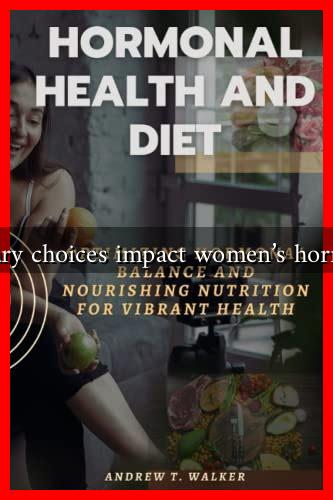-
Table of Contents
How Do Dietary Choices Impact Women’s Hormonal Health?
Women’s hormonal health is a complex interplay of various factors, including genetics, lifestyle, and, significantly, diet. The food we consume can profoundly influence hormone levels, menstrual cycles, and overall reproductive health. This article explores how dietary choices impact women’s hormonal health, providing insights into the best practices for maintaining hormonal balance.
The Role of Hormones in Women’s Health
Hormones are chemical messengers that regulate numerous bodily functions, including metabolism, mood, and reproductive processes. Key hormones affecting women’s health include:
- Estrogen: Vital for reproductive health and bone density.
- Progesterone: Plays a crucial role in the menstrual cycle and pregnancy.
- Insulin: Regulates blood sugar levels and fat storage.
- Cortisol: The stress hormone that can impact weight and mood.
Imbalances in these hormones can lead to various health issues, including polycystic ovary syndrome (PCOS), endometriosis, and menopause-related symptoms. Understanding how diet influences these hormones is essential for maintaining optimal health.
Dietary Choices That Support Hormonal Balance
Several dietary choices can positively impact women’s hormonal health. Here are some key components to consider:
1. Healthy Fats
Incorporating healthy fats into the diet is crucial for hormone production. Fats are essential for the synthesis of steroid hormones, including estrogen and progesterone. Sources of healthy fats include:
- Avocados
- Olive oil
- Nuts and seeds
- Fatty fish (e.g., salmon, mackerel)
Research indicates that women who consume a diet rich in healthy fats may experience fewer hormonal imbalances and improved menstrual regularity.
2. Fiber-Rich Foods
Fiber plays a significant role in hormone regulation by aiding in the elimination of excess estrogen from the body. High-fiber foods include:
- Whole grains (e.g., quinoa, brown rice)
- Fruits (e.g., berries, apples)
- Vegetables (e.g., broccoli, carrots)
- Legumes (e.g., lentils, chickpeas)
A study published in the journal Nutrients found that women with higher fiber intake had lower levels of circulating estrogen, which may reduce the risk of hormone-related cancers.
3. Antioxidant-Rich Foods
Oxidative stress can disrupt hormonal balance, making antioxidants vital for women’s health. Foods rich in antioxidants include:
- Berries (e.g., blueberries, strawberries)
- Dark chocolate
- Green tea
- Leafy greens (e.g., spinach, kale)
Antioxidants help combat oxidative stress, potentially reducing the risk of hormonal disorders.
Foods to Avoid for Hormonal Health
While certain foods can support hormonal balance, others can disrupt it. Here are some dietary choices to limit:
- Processed Foods: High in sugar and unhealthy fats, these can lead to insulin resistance.
- Refined Carbohydrates: Foods like white bread and pastries can spike blood sugar levels.
- Excessive Caffeine: High caffeine intake can increase cortisol levels, leading to stress and hormonal imbalances.
- Alcohol: Excessive consumption can disrupt estrogen metabolism and lead to imbalances.
Case Studies and Statistics
Numerous studies highlight the connection between diet and hormonal health. For instance, a study published in the American Journal of Clinical Nutrition found that women who followed a Mediterranean diet, rich in whole foods and healthy fats, reported fewer symptoms of hormonal imbalance compared to those who consumed a standard Western diet.
Additionally, a survey conducted by the Office on Women’s Health revealed that 60% of women experience hormonal imbalances at some point in their lives, emphasizing the need for dietary awareness.
Conclusion
Dietary choices play a crucial role in women’s hormonal health. By incorporating healthy fats, fiber-rich foods, and antioxidants while avoiding processed foods and excessive sugar, women can support their hormonal balance and overall well-being. Understanding the impact of diet on hormones empowers women to make informed choices that promote long-term health. As research continues to evolve, it is clear that what we eat significantly influences our hormonal health, making dietary awareness an essential aspect of women’s health management.

